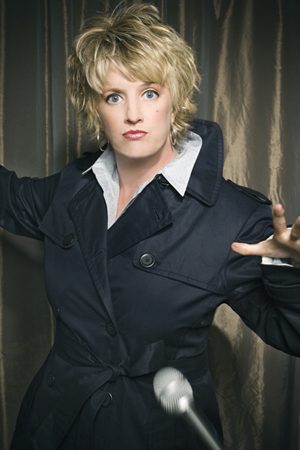The lesbian comic shows laughter is still the best medicine.
A legend among lesbian comedians, Suzanne Westenhoefer has been making us laugh for two decades. This year she celebrated both her 50th birthday and the beginning of a new tour—both the same night, onstage at Dinah Shore.
The new tour is aptly named Semi-Sweet; hysterical and undeniably dark, the material covers the events of Westenhoefer’s recent years, which have included multiple back surgeries, terminally ill family members and a divorce. Westenhoefer’s quick to point out the ups as well though. With 50 years under her belt, her career shows no signs of decline, and I spoke with her just days after completing shooting a new film with director Nicole Conn.
So your tour began with Dinah Shore, right?
Well, the tour never actually ends, we just rename it every spring. I never stop doing stand-up.
How many times have you performed at Dinah Shore now?
We were just talking about this, it’s such a great question. I think, I’m not sure, I’m really not sure, but the first time was ’94. I know that. And what did we figure out? Like, 12, I think maybe.
Are there any other cities or venues that you’re looking forward to in particular?
I think every comic will tell you they have some favorite cities just because they’re consistent. San Francisco is a favorite comic city because there’s an audience of people who are smart, politically aware, literate, but not so jaded like an L.A. or a New York audience. You know what I mean? They’re coming out to have a good time. And so you can kind of go anywhere you want. And even though they’re pretty politically correct, you can still be very politically correct and then they’ll debate it with you after.
Tell me about the new film you’re working on.
We just finished recently shooting it actually, a new Nicole Conn film, called A Perfect Ending. It’s a really great love story, and I play the hooker with a heart, who’s best friend of one of the girls.
And also we just finished season two of the web series that I do. It’s called We Have to Stop Now. It’s about two lesbian therapists, but it’s very funny—they’re like two lesbian therapists but they can’t make their own relationship work. And I’m their therapist. So we just finished season two of that, and it will probably soon be available on DVD. The first season’s available already on DVD.
A few years ago Curve readers voted you the funniest lesbian comic. If you were to vote, and couldn’t vote for yourself, who would you have voted for?
Oh my God, I couldn’t possibly do it. I’ll tell you why, because I am friends with probably 70 percent of working lesbian and gay male comics out there, and I could never do it. It would have to be completely anonymous. Can you imagine? It would just be so horrible. I’m actual close, hanging-out, friends, with far too many people who make their living at stand-up for me to pick one. I can tell you that Kate Clinton, going before me—she started in the ’80s—was just really great fortune for me because she showed me it could be done and she was a genius.
It sounds like there’s a solid community, then, among lesbian comedians. Do you feel like you’re in competition each other also?
I don’t feel that. I think maybe I did when I first started. But back then I was competing with straight comics, just trying to get stage time. And it was very difficult because I was openly gay, and it was straight clubs and it just wasn’t being done. And now, of course, I’ve been on the road for 17 years and at stand-up for almost 20, I actually having comics go up to me, you know, telling me, “You’re like the elder stateswoman.” And I’m like holy shit, I went from just being one of the pack … When gay stand-up started, you could count the names on one hand. By the time I came along, in ’90, maybe two more were added, aside from me. During the ’90s, there was a whole other group, which seemed like a lot at the time, but was probably really only about 15 other people. And now, there are probably a couple hundred openly gay stand-up comics out there. And I don’t feel in competition with them—I mean, unless someone would actually say, “I don’t want you, I want her.”
